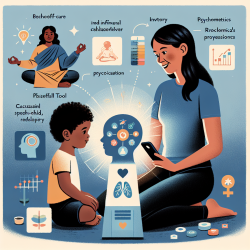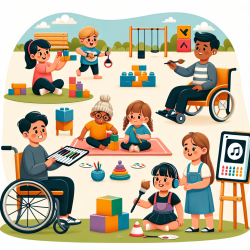Transforming Child Outcomes with the Self-Care of Informal Caregivers Inventory
In the ever-evolving field of speech-language pathology, we are constantly seeking innovative ways to enhance the outcomes for children. A recent study titled Development and Psychometric Evaluation of the Self-Care of Informal Caregivers Inventory provides a groundbreaking tool that could revolutionize how we support informal caregivers, ultimately benefiting the children they care for.
Understanding the Self-Care of Informal Caregivers Inventory
The study, conducted by Dorri and Riegel, introduces the Self-Care of Informal Caregivers Inventory, a theory-based instrument designed to measure self-care behaviors among informal caregivers. This inventory is rooted in the Middle-Range Theory of Self-Care of Chronic Illness and categorizes self-care into three dimensions: maintenance, monitoring, and management. Each dimension is meticulously validated, showing strong psychometric properties, making it a reliable tool for assessing caregiver self-care practices.
Why Self-Care Matters for Caregivers and Children
Informal caregivers often prioritize the needs of their loved ones over their own, leading to neglected self-care practices. This neglect can result in physical and emotional exhaustion, impacting their ability to provide optimal care. For children, especially those with special needs, the well-being of their caregivers directly affects their developmental outcomes. Ensuring caregivers maintain good self-care practices is crucial for the child's progress.
Implementing the Inventory in Practice
Practitioners can use the Self-Care of Informal Caregivers Inventory to identify areas where caregivers may struggle with self-care. By understanding these areas, practitioners can offer targeted interventions and support, promoting better health outcomes for both caregivers and children. Here’s how you can implement this tool in your practice:
- Assessment: Use the inventory to evaluate caregivers' self-care practices, focusing on maintenance, monitoring, and management.
- Intervention Planning: Develop personalized intervention plans based on the inventory results, addressing specific self-care deficits.
- Education: Educate caregivers on the importance of self-care and provide resources to support their self-care journey.
- Follow-Up: Regularly reassess caregivers using the inventory to track progress and adjust interventions as needed.
Encouraging Further Research
The introduction of this inventory opens up numerous research opportunities. Practitioners are encouraged to conduct further studies to explore the inventory's impact on caregiver and child outcomes across different settings and populations. By expanding the research, we can continue to refine and enhance the tool's effectiveness.
In conclusion, the Self-Care of Informal Caregivers Inventory is a valuable asset for practitioners aiming to improve child outcomes. By prioritizing caregiver self-care, we can create a supportive environment that fosters positive development in children.
To read the original research paper, please follow this link: Development and Psychometric Evaluation of the Self-Care of Informal Caregivers Inventory.










